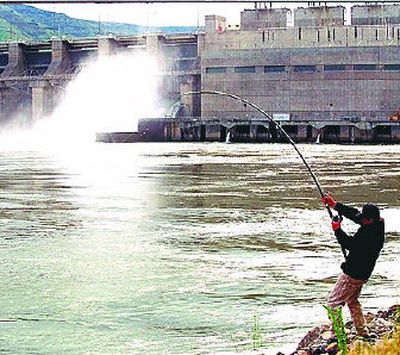Court rejects administration salmon plan

A federal judge in Portland was right to reject the government’s plan for operating Columbia and Snake River dams that could push some runs of salmon closer to extinction, an appeals court ruled Monday.
The 9th U.S. Circuit Court of Appeals said a 2004 federal plan, known as a Biological Opinion or BiOp, is “structurally flawed” and violates the Endangered Species Act. The federal agency that wrote it, then known as the National Marine Fisheries Service, had argued that the federal dams were part of the “immutable environment” because they existed before the law was passed.
The federal plan “amounted to little more than an analytical sleight of hand, manipulating the variables to achieve a ‘no jeopardy finding.’ ” Judge Sidney R. Thomas wrote for the three-judge panel based in San Francisco.
The coalition of sport fishermen, tribes and environmental groups who challenged the BiOp applauded the ruling.
“Two decades of federal failure and dishonesty must stop here,” Dan Ritzman, Northwest regional director for the Sierra Club, said. “Our region needs a scientifically sound, economically viable solution and that solution includes removing the four dams on the lower Snake River.”
The fisheries agency, now known as NOAA Fisheries, was withholding comment until it studied the ruling, a spokesman said.
But the ruling wasn’t really surprising because the appeals court has previously backed U.S. District Judge James Redden on his ruling about the dams, endangered fish and the rivers systems, said the head of a trade group for public utilities that get electricity from the dams.
“I don’t know that it’s going to make that much difference,” said John Saven, chief executive officer of Northwest Requirements Utilities.
NOAA Fisheries, the other federal agencies that have some responsibility for maintaining or operating the dams or selling their power, are working on a new BiOp that Saven said will take a more comprehensive approach to the environment.
Removing or breaching Snake River dams was a topic of discussion before 2001 when President Bush took office. But Bush and other Republicans campaigned in 2000 on “saving” the dams, and the federal agencies offered a new approach in trying to redraft the BiOp after Redden rejected a previous version. They described the dams as part of the environment that can’t be altered, so the agencies wouldn’t have the discretion to consider changes in the way the dams, reservoirs and locks operate.
There are also competing interests – power, irrigation and barge traffic – that should be weighed along with legal requirements to save endangered salmon, the agencies said.
“Compliance is not optional” on the Endangered Species Act, the appeals court said.
A federal agency can’t get around the law by labeling something “nondiscretionary” or saying there’s a competing interest, the panel added. Instead, it must balance the competing demands and honor the species act’s obligations.
The law requires that federal agencies take no action that results in “destruction or adverse modification” of critical habitat for endangered animals, the three-judge panel said. The BiOp must also consider ways for the endangered salmon runs to recover, not just survive.
The appeals court acknowledged the ongoing nature of the dispute, starting its opinion with the comment that the appeal “brings us once more to the Pacific Northwest, for another round in the complex and long-running battle over salmon and steelhead.”